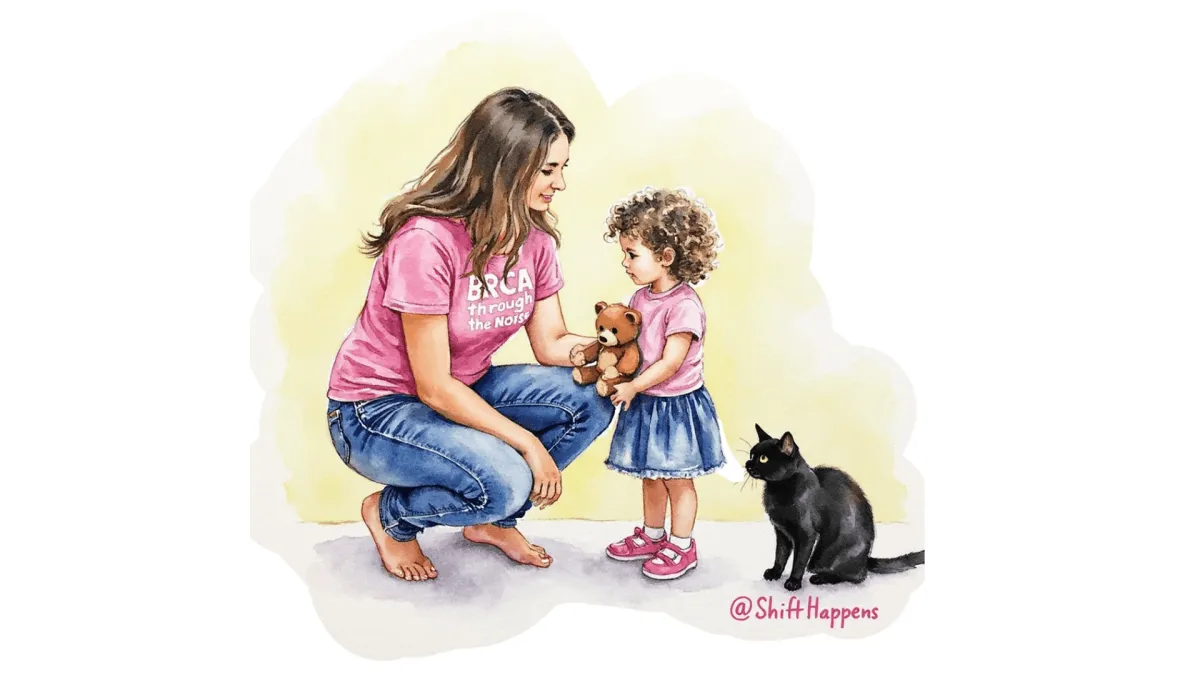
How Do I Talk To My Kids About Cancer: A Gentle Guide for Parents
Right. Deep breath. Let’s begin here.
If you’ve landed on this page wondering, “How do I tell my child someone they love has cancer?”
– whether that someone is a parent, grandparent, or even yourself – you’re not alone.
Maybe someone’s already in treatment.
Or maybe you’ve just discovered you’re BRCA1 positive—a pre-vivor—and you’re about to make big preventative decisions before cancer ever arrives.
Either way, it’s massive. And when there are children in the mix, it adds layers of fear, love, and uncertainty—all at once.
I know, I have been there. BUT…You can say this in a way that feels steady, truthful, and loving. And I’ll help you do it.
First: What the experts say
Cancer Research UK reminds us:
“Being open and honest is almost always the best way with children… uncertainty or not knowing may be harder for them to cope with than the truth.”
The NHS agrees: telling children the name of the cancer, where it is, how it’s treated, and that it’s not their fault is the kindest, clearest path.
Keeping things clear, honest, and age-appropriate isn’t just nice—it helps reduce child anxiety and builds their trust in the long run
My story; so you can see this works
I’m BRCA1 positive, a pre-vivor. I’ve never had cancer—but I’ve made big choices to reduce my risk.
My daughter was 13 when I had preventative surgeries. She didn’t really remember my mum—who we lost to two cancers—because she was just two at the time. We have the photos: my mum, bald, sitting cross-legged by her toy kitchen—but for my daughter, that was just a picture, not a memory.
We built honesty into our home. No secrets. If she overheard me on the phone or asking questions to others, that was okay. She grew up with openness, not hiding.
And it worked—we’ve never had a Big Sit-down. Just tiny, steady moments of truth and space to ask questions.
Actually, this still continues too, I am doing this work very openly in our home.
In the back of my mind, I am wondering almost daily if she has the gene-mutation too. She has not brought up the testing element of it yet (she is only 21) and that’s ok.
I will be here when she is ready.
So, how to go about it?
Step 1: Calm your body
This is vital: anxiety makes you freeze. But with one soft breath reset, you can bring yourself back:
Feet grounded
Inhale 4, hold 2, exhale 6
Gently think: “I’ve got this with love.”
That helps you show up—not shut down.
Step 2: Gentle truth, based on age
You don’t need to script it—just give clear, compassionate info:
Little ones:
“Nanny has something called cancer—her body isn’t working quite right. The doctors will help. It’s not your fault.”
Primary school age:
“Mum’s been to hospital and we found out she has cancer. The doctors are ready to treat her. You can ask anything—no question is too small.”
Older children/teens:
“I want you to have the facts. I’m going to tell you when things change. Do you want me to share everything, or just check in now and then?”
The NHS suggests straightforward phrasing about location, treatment, and guilt-free reassurance every time.
Step 3: Let them lead with questions
Open-ended questions from Cancer Research UK help here:
Try asking, “What have you heard? Is there anything you’re unsure about?”
Then listen. They may not answer right away. That’s okay.
Step 4: Meet your own hard thoughts
You’re allowed to spiral. Try these gentle re-frames:
“If I cry, they’ll be scared” → “Tears show I’m human—and safe.”
“I must be strong” → “Strength is honesty, not perfection.”
“I’ve already messed it up” → “Repair is possible—let’s try again.”
Step 5: Stay consistent and anchored
No one-time chat. It’s an ongoing thread you weave into life: breakfast, bedtime, toy room, school run.
Let routines be their anchor.
Let laughter and play be their medicine.
Let honesty be the way you walk through this—together.
Final word
If you read this thinking, “That’s exactly where I am right now”, then this is for you.
You’re not alone. You’re right here, with love in your heart and the right intention.
If you need a few supporting tools, I have created some:
Gentle-Guide PDF – ‘Talking To Your Child about Serious Illness’ - 9 pages of top tips - £4.99
Flipbook – ‘What Colour Is My Day’ visual prompts, conversational starters - £4.99
Book list – age-appropriate stories that help open the conversation - free
Want more?
CREATE A LINK TO THIS BLOG HERE ONCE IT IS WRITTEN:
A follow-on blog will dive into how to talk to older kids about genetic risk, BRCA+, prevention choices, and the emotional terrain of not having had cancer, but living with risk.
